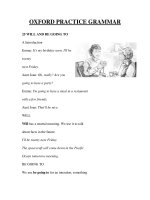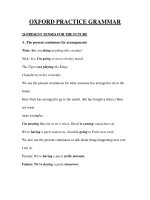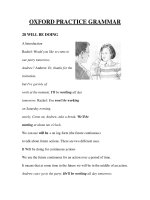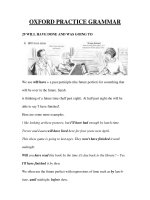Tài liệu OXFORD PRACTICE GRAMMAR 137 pptx
Bạn đang xem bản rút gọn của tài liệu. Xem và tải ngay bản đầy đủ của tài liệu tại đây (87.43 KB, 6 trang )
OXFORD PRACTICE GRAMMAR
137 THE RELATIVE PRONOUN AS OBJECT
A Subject and object
Harriet is showing David her holiday photos.
Harriet: That's an old castle that we visited on holiday. And those are some
people we met, a couple who were
staying at the campsite.
David: Mm. They look very friendly.
A relative pronoun such as who or that can be the subject of a relative
clause.
Harriet talked to a couple who were staying at the camp-site. ( Theyi were
staying at the camp-site.)
The postcard that came this morning was from Harriet. (
It came this morning.)
A relative pronoun can also be the object of a relative clause.
Mike and Harriet are visiting
a woman who they met on holiday.
(They met her on holiday.)
The old castle that we visited was really interesting.
(We visited it. )
We do not use another pronoun like her or it with the relative pronoun. NOT
a woman who they met her NOT -the old castle that we visited it
B Leaving out the relative pronoun
We can leave out the relative pronoun when it is the object of the relative
clause. We do this especially in
spoken English. Compare these examples.
WITH OBJECT PRONOUN WITHOUT OBJECT PRONOUN
The man who Vicky saw at the concert is Sarah's The man Vicky saw at the
concert is Sarah's
boss. boss.
That's an old castle that we visited. That's an old castle we visited.
Here are some more examples of relative clauses without an object pronoun.
We
don't know the name of the person the police are questioning. The cakes
Melanie baked were delicious. That jacket you're wearing is falling to
pieces,
Mike.
Remember that we cannot leave out a pronoun when it is the subject of a
relative clause.
The man who spoke to Vicky is Sarah's boss.
C Who and whom
In formal English, whom is sometimes used when the object of the relative
clause is a person. The
person who/whom the police were questioning has now been released. But
in conversation whom is
not very common.
137 EXERCISES
i Subject and object (A)
Comment on the conversations. Add a sentence with who or that as the
subject of the underlined part.
► She's Tom's new girlfriend. ~ Who is? ~ That girl. She just said hello.
That's right. The girl who just said hello is Tom's new girlfriend.
1 The dog has been rescued. ~ What dog? ~ It fell down a hole.
Haven't you heard? The
2 The story was untrue. ~ What story? ~ You know. It upset everyone.
Yes, the
3 He's a film producer. ~ Who is? ~ That man. He interviewed Natasha.
That's what I heard. The
Now comment on these conversations. Add a sentence with who or that as
the object of the underlined part.
4 The accident wasn't very serious. ~ What accident? ~ Oh, Daniel saw it.
Yes, the
5 He's a millionaire. ~ Who is? ~ That man. Claire knows him.
It's true. The
6 The vase was extremely valuable. ~ What vase? ~ You know. David broke
it.
That's right. The
7 It's really nice. ~ What is? ~ The jacket. Melanie wore it at the party.
Yes, it is. The
2 Leaving out the relative pronoun (B)
Complete the script for these TV advertisements. Use a relative clause
without a pronoun.
► Fresho soap. Beautiful people use it. It's the soap beautiful people use.
1 An Everyman car. You can afford it…………………………………
2 'Hijack'. People want to see this film………………………………
3 Greenway Supermarket. You can trust it.
4 'Cool' magazine. Young people read it.
5 Jupiter chocolates. You'll love them ……………
3 Leaving out the relative pronoun (B)
Look carefully at these sentences. Are they correct without a relative
pronoun? Where you see *, you may
need to put in who, which or that. Write the sentences and put in a pronoun
only if you have to.
? The man * paid for the meal was a friend of Tom's.
The man who paid for the meal was a friend of Tom's.
? The meeting * Mark had to attend went on for three hours.
The meeting Mark had to attend went on for three hours.
1 Somewhere I've got a photo of the mountain * we climbed.
2 The man * repaired my car is a real expert.
3 The detective lost sight of the man * he was following.
4 I thought I recognized the assistant * served us.
5 I'm afraid the numbers * I chose didn't win a prize.









